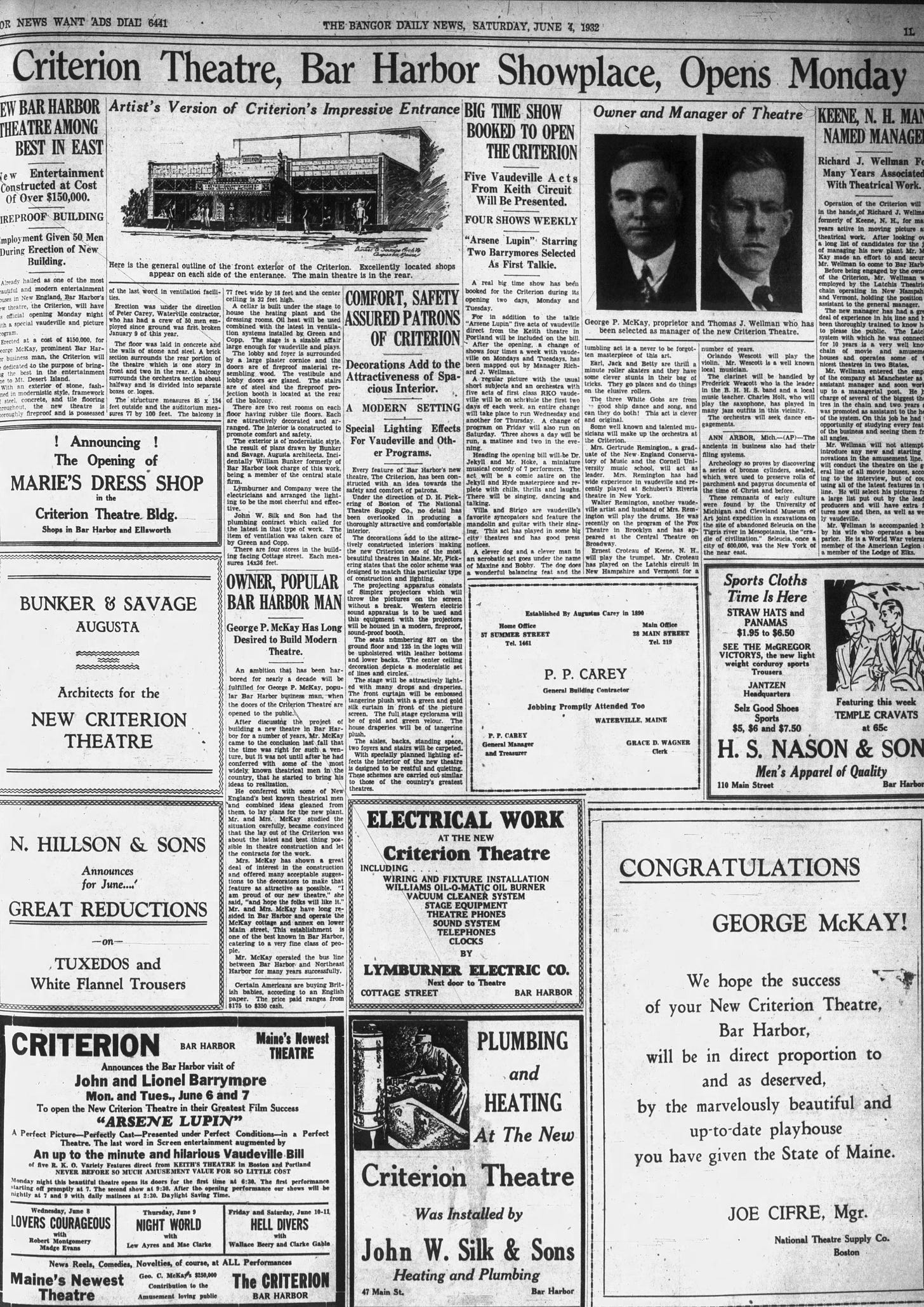Criterion's Future Is Uncertain
Staff let go and theater closed as board contemplates extensive repairs and way to move forward
BAR HARBOR—Flow like a river: that’s what former Criterion Theatre Production Manager Chuck Colbert would tell the staff before big events and performance.
Do your work. Take obstacles in stride. Do it all with love. Flow like a river.
As of January 12, Colbert and the staff of The Criterion Theatre, a historic community center on Cottage Street in Bar Harbor have met a large obstacle in that river. The staff has been let go. The theater has shut its doors. When and how it reopens will depend on a few things, including a much needed repair of the structure’s walls.
A December 20 article by the Bangor Daily’s Bill Trotter, reported that the theater would be closing for an indefinite period to fix the rear brick wall of the building. This was confirmed in a press release from the theater’s board earlier this week.
Colbert has worked at the theater for nine years. Other full-time staff include former Front of House Manager and acting Director Beverly Guay and former Operations and Development Manager Sophie Joyce. Colbert said that there are also about seven people who work concessions.
The board hopes to lease the building to another group or business. That business would have creative control of the building and the ability to create programming and hire staff. The nonprofit itself will remain but only to safeguard and fundraise to keep the historic building safe and preserved.
STRUCTURAL ISSUES
Approximately 18 months ago, the board of the theater hired an engineer for a complete study of the Criterion’s exterior brickwork because board members were worried about the building’s integrity.
“We have a 93-year-old building that was showing signs of deterioration even to the laymen's eyes,” said Board President Stephen Leiser in a press release. “The study proved we were correct and we were given an estimate of approximately $1.7 million dollars for the brickwork to get back to a condition that would sustain the safety and protection of the bricks. We were told at that time that the back wall of the theatre needed to be addressed sooner than later. We had additional engineering work done so that we could do this work in the least disruptive manner and the most efficient time frame. The work for this section of the wall (just on the inside alone) is over $100 thousand.”

In the last ten years, the non-profit has owned and operated the theater, running at an average annual deficit of $150,000, Leiser said.
According to ProPublica, the theater operated at an approximate $174,000 loss for the fiscal year ending December 2023.
“Thankfully, because of a generous donor and the work of an active non-profit board, we were able to raise funds and keep the theatre alive and well,” Leiser said. “Our goal during this time period was to have a capital campaign and raise sufficient funds that would generate interest to cover our annual deficit. As any nonprofit on this island can testify, an endowment is the lifeline to keep most nonprofits in the black. Theaters across Maine and the country in general struggle with cash flow and a balanced budget when competing against on line streaming for both movies and music.”
The extensive repairs have added a strain on the budget.
“We have signed a contract with the engineering firm and a construction specialist to do the inside work that will secure the back wall,” Leiser said. “The outside work should be done at a later date but within the next year or so. The former director of the theatre was well aware of all of this information and work. The board was lead to believe that the staff was also being kept informed of all of the issues and the future project.”
Leiser’s comment is referring to the past full-time director, Taylor Valarik. This fall Valarik left to pursue another career. Guay has been performing director duties since then.
“My only comment as the former acting executive director of The 1932 Criterion Theatre is that I believe that if the board had been doing its due diligence and was following the by-laws of the 501c3 organization, we would still be in operation today,” Guay said. “Once I learned of our dire financial situation, I immediately contacted a member of the executive committee and began the motion of asking to begin an emergency capital campaign. This request was not approved under claims that they needed more time to weigh the options. Meanwhile, I am now without a job. And the greater MDI community (is) without its theatre.”
THE COMMUNITY OF THE THEATER
And it’s a theater that has meant something, not just to the staff, but to the community.
For Colbert, there are multiple stories and moments that give him joy when he thinks about the staff and performances at the theater. Working with the Bar Harbor Music Festival and its amazing musicians always stands out, he said. But also, seeing musicians performing on a big stage for the very first time—something that happens when school bands and choirs have visited—that’s beyond special.
“I could see the spark in their eyes,” Colbert said of the kids performing on the big stage.
That spark has happened in a lot of ways. People have fallen in love. People have sat enraptured while Ashley Bryan or others took the stage. People have won contests, had adventures, ghost tours, been inspired, been motivated, been informed.
Everyone involved hopes that will continue.
Built in 1932, the theater, on Cottage Street in Bar Harbor, is only one of two that still exist in Maine. Built by George McKay Sr., the theater has a lot of nooks and crannies in its basement and a feel of old school opulence. McKay had been jailed for bootlegging in the 1920s. At the theater he began a bit more of a respectable life, hosting events for charities in the 760-seat venue. He also became a member of the Lion’s Club (a service club) and St. Savior’s Episcopal Church. There were four shows a week.

In 2012, the theater began its latest incarnation when Michael Boland created a nonprofit, the Bar Harbor Jazz Festival, and the structure was restored, and an anonymous donor gave $2 million in 2014 to help the theater survive and revive. The 13-member board is currently lead by Leiser, Nicholas Schoeder, Nicholas Walton, and Susan Raab.
THE FUTURE
Now, the additional cost of repairing the historic building has put a strain on the non-profit’s budget. Even with its dedicated staff, the theater has not been able to consistently balance that budget. In the last ten years, the theater has competed against at least ten large capital campaigns in the area, Leiser said, which has impacted its ability to find donors.
“When our director vacated his position, we were at a cross roads for the theatre. We were not in a position financially to offer the director's position to another person. We would have been out of funds within a six-month period with the payroll as established,” Leiser said of the board’s decision. “The board voted to look at all options in the best steps forward. One of the options discussed was to lease the space. This would allow the board to focus on fund raising for the building and the endowment and not the day-to-day operation.”
Colbert was offered part-time work to do maintenance work for the rest of the winter for 10 hours a week. He said he countered with a list of needed projects and to work for 20. That offer was declined.
The board’s hope is that the nonprofit itself will remain but would focus on safeguarding and fundraising to keep the historic building safe and preserved. If the board cannot find another party to lease the building, the theatre will likely have to stay closed until the board has investigated all other options.
“Our goal is to secure the integrity of the structure, preserve the character and historical significance of the building, and its role in the community. We would like nothing more to have continued music/art and community service in the Grand Old Theatre. As a board, we are also aware of not putting ourselves and the building in a position of not being able to pay debt or other obligations,” Leiser said.
The news has come as a blow to the Criterion’s staff and community.
“First kisses happened up in that balcony. It should be a place that the town can expect to be there and be open,” Colbert said.
Concessions staff have grown up in the theater. The last staff has created multiple small community events in between shows in the past year—improv sessions, guitar classes, and shadow theater performances. Those shows, Colbert said, boosted community connections and connections within the staff, which operates like a family.
Colbert also stressed that he understands that theaters across the country have had difficulty staying open.
His vision of the theater’s future? It would flow like a river.
Not just that though, it would be a place that puts an emphasis on coproducing and fostering new talents across the island—be that Acadia Community Theater, singers from Southwest Harbor, dancers, musicians, and more. It would focus on the type of programming that combined local organizations and acts with the bus and trailer tours like the first event he worked at the theater as a volunteer—Steve Earle. And it would make a profit. It would survive.
“I really hope the right people get in there,” he said. “It’s such a beautiful place. This place is just special—at the end of the road—it’s just amazing. I hope only for the best for theater.”
“It can rebuild,” Colbert said.
It has before.
THEATERS AND COMMUNITY
The Criterion’s struggles are not isolated.
In 2024 Bangor’s Queen City Cinema Club, a restaurant and live music venue, and Bangor Arts Exchange closed. The headline of a 2023 New York Times article announced, “A Crisis in America’s Theaters Leaves Prestigious Stages Dark.”
“Why is this happening?” Michael Paulson asked in his article for the Times. “Costs are up, the government assistance that kept many theaters afloat at the height of the pandemic has mostly been spent, and audiences are smaller than they were before the pandemic, a byproduct of shifting lifestyles (less commuting, more streaming), some concern about the downtown neighborhoods in which many large nonprofit theaters are situated (worries about public safety), and broken habits (many former patrons, particularly older people, have not returned).”
Others are trying to rally behind theaters and their importance to community.
In 2008, James Arvanitakis wrote that people must desire community before they find it. One of the places that they can find it is at the Criterion. Shadow casts recreate shows for audiences. Bands grace the stage, one after another. Children visit, sometimes take guitar lessons. Movies elicit communal gasps and cheers. In a time where screens take a lot of our time, a place like the Criterion is valuable specifically because it is a gathering place that focuses on the arts, focuses on the community, and on the needs people have for connection and art.
“Beyond its entertainment value, theatre plays a pivotal role in shaping communities and fostering social bonds,” Wayne Theater writes. “From local productions to community-driven initiatives, theatre offers a myriad of benefits that extend far beyond the stage.”
A community theater weaves into the community’s fabric. A town’s history, its values, its art, its stories are all reflected in local theater venues. Many theaters are considered a community’s soul. They become cultural hubs and can have an economic impact as well as places for community dialogue.
HISTORY OF THE THEATER VIA THE CRITERION WEBSITE
The theater first opened at 7 p.m., Monday, June 6, 1932 with a lavish celebration that lasted until after midnight. Almost 2,000 gathered for two separate shows. There were speeches and vaudeville acts. A seven-piece orchestra played and the theater screened “Arsene Lupin,” which starred John Barrymore, Lionel Barrymore, and Karen Morley.
Telegrams came from Greta Garbo and Joan Crawford. They were read to the audience.
“George C. McKay, Sr., founder of the Criterion Theatre, had previously served a one-year term at the Bangor jail beginning in August of 1923, sentenced by US District Court Justice John Andrew Peters for violating the Volstead Act (for bootlegging). His friend Daniel Herlihy, the ‘Rum King’ of early 1920's Bar Harbor, was sentenced to federal penitentiary in Atlanta, Georgia for a one-year term,” The Criterion’s website reads. “Their indictments, along with that of Malvern Greenhouse owner John Stalford and several other bootleggers from the Southwest Harbor area were pursued by deputy customs collector Howe Higgins, District Attorney Frederick R. Dyer, and Maine Governor Percival Baxter, who promised to rid Maine of ‘the whole brood of liquor offenders’ in his 1923 inauguration address.”
McKay finished his term and ended up being a member of the MDI Lions, St. Saviour's Episcopal Church, and the Hayseeders.
“He and his wife, Ethel Thomas McKay, also served as gracious hosts for sundry local events at the Criterion, including those for the Civilian Conservation Corps (C.C.C.), the Relief Association (for Depression-era unemployed), the annual "Community Santa Claus Fund" drives, the March of Dimes, The American Legion (Post 25), Amateur Vaudeville Shows, Brownie Troop #17, and the Jackson Memorial Laboratory,” the website reads.
The Art Deco theater features floating balconies. It is one of only two Art Deco theaters in the state. It is the only one that has maintained its original auditorium.
According to the website, “Betty Jane ‘B.J.’ (Noyes) Morison and her husband Peter G. Morison bought the Criterion from George C. McKay, Sr.’s daughter, Dr. Marguerite McKay Dwyer and her husband Dr. Clement Story Dwyer in 1966, and maintained ownership until 2001. B.J. was known for her intolerance for tomfoolery in the theater, and would demand that people spit gum into her open palm while she collected tickets at the entrance! She and Peter regularly hosted the MDI Film Club at the theater, and welcomed the lifting of the Motion Picture Production Code, which was replaced by the MPAA Film Rating System in 1968.”
Between 2011 and 2014, the theater changed hands twice.
“Unfortunately, due to financial hardship, the theater was closed for some time towards the end of this iteration. Fortunately, in late 2014 one of the theatre's former owners, Michael Boland, rallied forces and organized a new nonprofit entity, bolstered by a generous $2 million donation from an anonymous donor. Work began immediately thereafter to restore the theater to its former glory, including repairing major structural issues, installing a digital projector, reupholstering the seats, matching the original carpet, wall panels, and sconces, re-painting the ceiling, and incorporating many other thoughtful details.”
Disclosure: I was once the vice president of the Criterion Theatre board. It has been many years since then.
All photos Carrie Jones unless otherwise specified
Correction: We somehow managed to put a T on the end of Ashley Bryan’s name. It was corrected at 4:42 p.m., June 21. Many thanks to the alert reader who told us!
If you’d like to donate to help support us, you can, but no pressure! Just click here (about how you can give) or here (a direct link), which is the same as the button below.
If you’d like to sponsor the Bar Harbor Story, you can! Learn more here.
























I have been enjoying the Criterion since childhood (1950's). Having worked with a previous non-profit at the Criterion Theater I am well aware of its problems. Each different non-profit have done work on it to no avail. Somehow, we need a good grant writer to try for Federal and State grants. Mr. Boland has been a wonderful sponsor the past few years, but all good things must end. This town will be so much poorer if the Criterion is not saved and is sold to a private entity who doesn't care.
I’m sad that the Criterion is closed but I’m angry at how the employees were let go suddenly and with only one week’s notice. Poor management is to blame. I believe it’s the law that if an employee is required to give two weeks notice when they quit, then the employer is required to give two weeks notice or pay as well, plus any accrued vacation time, etc. I’m guessing that health insurance wasn’t offered. Employees are SOL, while board members simply shrug it off.